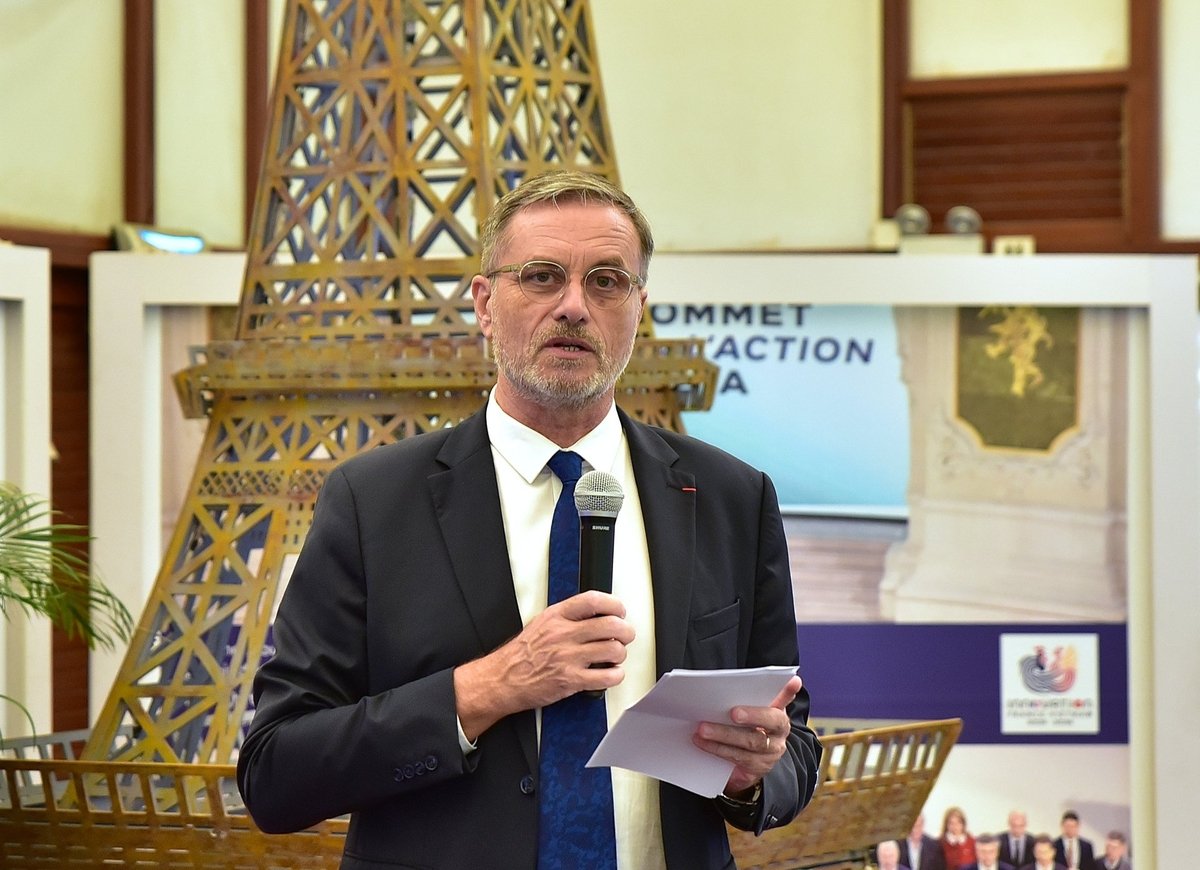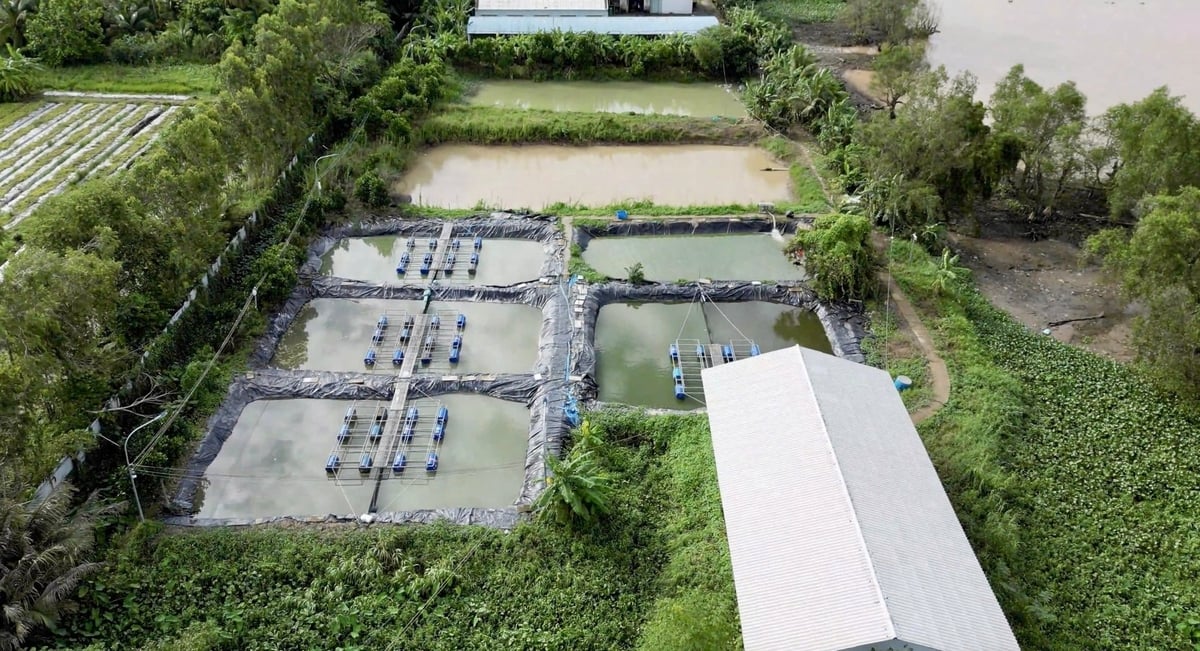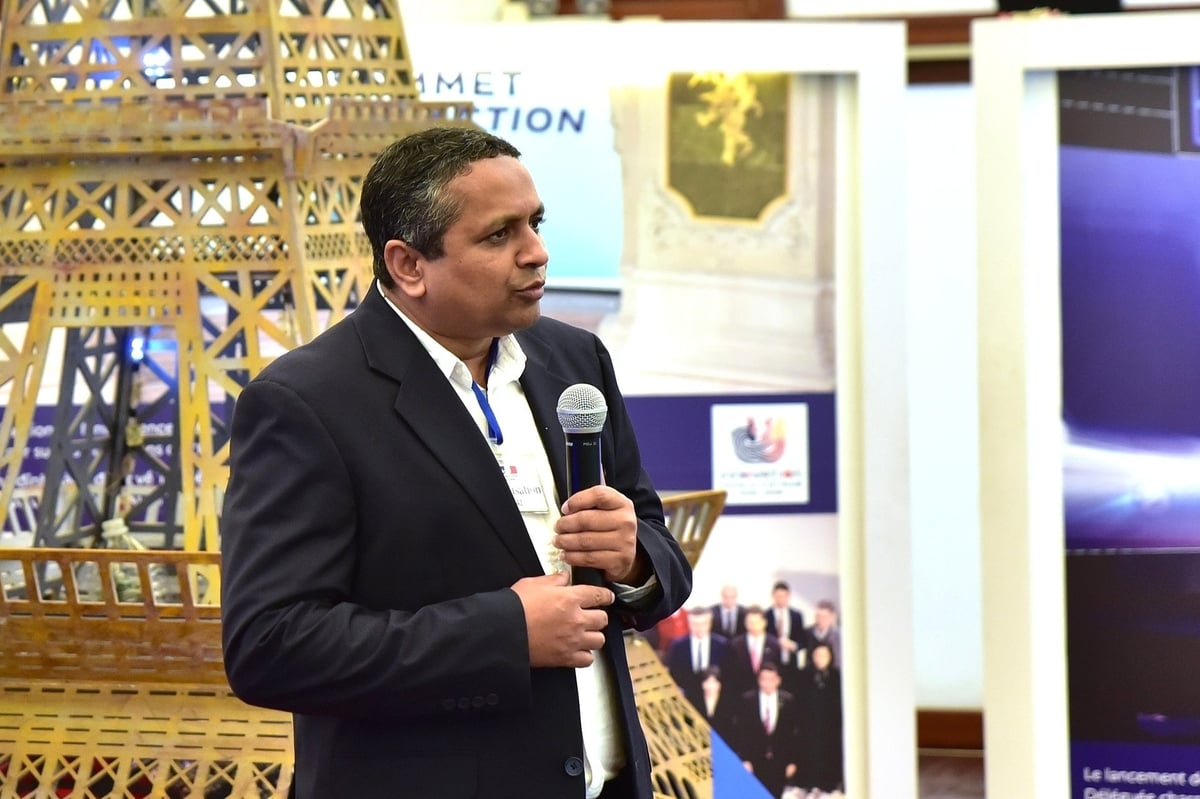December 6, 2025 | 09:52 GMT +7
December 6, 2025 | 09:52 GMT +7
Hotline: 0913.378.918
December 6, 2025 | 09:52 GMT +7
Hotline: 0913.378.918
Launched in 2023 and funded by the Solidarity Fund for Innovative Projects (FSPI) of the French Ministry for Europe and Foreign Affairs through the French Embassy in Vietnam, the 3R4CSA project promotes climate-smart aquaculture in the downstream Mekong Delta.
At the project’s closing meeting on July 31, Mr. Olivier Brochet, French Ambassador to Vietnam, shared: "The 3R4CSA technical project fully embodies the spirit of the France-Vietnam Comprehensive Strategic Partnership. It directly responds to the requests for cooperation expressed by Vietnam during the first France-Vietnam Agriculture Working Group held last December regarding the sustainable management of fisheries resources."
The project meets the Vietnamese Government's expectations of advancing a circular economy and reducing greenhouse gas emissions, in line with the roadmap for implementing the Paris Agreement on climate change.

Ambassador Olivier Brochet delivered opening remarks at the closing meeting of the 3R4CSA project, implemented from 2023 to 2025. Photo: Kieu Chi.
Under the coordination of the French Agricultural Research Centre for International Development (CIRAD), French and Vietnamese partners (IRD, INRAE, Can Tho University, Research Institute for Aquaculture No. 2, and Foreign Trade University) jointly explored sustainable management solutions for aquaculture waste, starting from the fundamental circular 3R principles (reduce - recycle - reuse).
Ambassador Olivier Brochet affirmed, "The zero-emission aquaculture project demonstrates that ecological transition can and must be economically viable: the circular systems implemented have reduced production costs, increased farm profitability, and enhanced resilience."
For the first time, the biotransformation of nutrients from aquaculture waste has been tested in the downstream Mekong Delta, opening new prospects for nutrient recovery and reuse within the food system.
According to Dr. Kazi Kabir, researcher at CIRAD and leader of the 3R4CSA project, circular feed can reduce input feed costs by up to 50% and lower dependence on imports, which currently account for as much as 70% of costs in intensive farming. As a result, overall profitability increases by around 30%, while the aquaculture sector strengthens its autonomy and resilience.
Over over two years of implementation, the project has successfully piloted two technologies for intensive white-leg shrimp farming: zero-discharge and waste reuse. It aims to expand intensive shrimp farming areas from 50 to 100 hectares by the end of 2025, to 1,000 hectares in 2026 - 2027 in Ca Mau province, while also extending another 1,000 hectares for extensive black tiger shrimp farming in 2026 - 2027, and developing seaweed farming in the Mekong Delta.

The zero-discharge shrimp farming model in Ca Mau promises to bring innovation to Vietnam’s shrimp industry. Photo: CIRA.
Dr. Nguyen Nhut from the Research Institute for Aquaculture No. II stated: "The super-intensive shrimp farming model using a closed-loop recirculating aquaculture system (RAS) has shown clear economic benefits as it ensures biosecurity, requires minimal water exchange, and achieves up to 90% water reuse, thereby significantly reducing operating costs. Seaweed cultivated alongside not only provides natural disease resistance but also helps lower water temperature, reducing stress on fish and shrimp caused by heat."
He added that the project’s economic impact is evident. Even low-tech farming generates a dual benefit: fostering economic growth and reducing environmental impacts.
"As Vietnam expands its export markets for products like tilapia, zero-emission aquaculture, and nutrient recycling from waste, not only carry environmental value but also create a competitive advantage over other countries," Dr. Nhut emphasized.
According to Dr. Kazi Kabir, research expert at CIRAD, while international trade fluctuations and climate change are reshaping global value chains, he believes this to somewhat presents opportunities for promising suppliers.
The project has diversified production systems in terms of contributions to local economies. The shrimp sector is already a developed value chain, largely managed by major investors. Secondary value chains from tilapia, other marine fish, and seaweed, however, can be driven by smaller communities and women. Research from the 3R4CSA project shows that less than 15% of women in the Mekong Delta currently participate in economic activities requiring technical work.
"The project has created favorable conditions for small and medium-sized enterprises (SMEs) in waste recycling, while also generating employment opportunities for women in vulnerable communities," noted the CIRAD project leader.

Dr. Kazi Kabir shares the outcomes of the 3R4CSA project, serving as a springboard for the AquASEAN fisheries regional cooperation program. Photo: Kieu Chi.
Dr. Kabir further noted that China, which accounts for 65 - 70% of global production, will cut its output by 5% by 2030 in pursuit of environmental goals. This will create a significant gap in the market, opening opportunities for other producers such as Vietnam, Indonesia, India, and Bangladesh to scale up production and fill the void.
Therefore, diversification is essential. He reaffirmed the vast potential of seaweed and microalgae and the development of value chains from these two resources: "Seaweed is a major global value chain, attracting substantial investment flows. At the same time, with Vietnam's commitment toward Net Zero, seaweed also holds potential for carbon sequestration. We have made an important step forward by shifting to microalgae production from nutrient waste, and currently, microalgae have a market value three times higher than seaweed."
More than 100 students from Can Tho University and 300 farming households have been trained in applying the 3R principles to climate-resilient aquaculture. Several training courses were organized in Ca Mau between 2023 and 2025 for farmers, small businesses, and government officials.
These activities foster an entrepreneurial spirit, with a special focus on women and youth, while supporting the objectives of the France - Vietnam Year of Innovation: promoting innovation through international cooperation, public - private partnerships, and advanced training for the next generation of students.
Translated by Kieu Chi

(VAN) After three years, Project FST/2020/123 collected approximately 3,000 insect specimens, classified them into about 50 morphological groups, and identified around 40 species, including several new species.
/2025/12/01/0509-2-175427_206.jpg)
(VAN) Emission-reducing coffee areas in Lam Dong have entered the new crop with stable yields, improved quality, and a remarkably enhanced cultivation environment.

(VAN) The Institute of Agricultural Sciences for Southern Vietnam (IAS) marked its 100th anniversary in Ho Chi Minh City, celebrating a century of growth as a leading institute contributing significantly to Viet Nam’s agricultural development.

(VAN) An increasing number of livestock farms are using biogas generators to create a source of renewable electricity, helping to save costs and mitigate environmental pollution.

(VAN) Small changes in rice cultivation, from irrigation methods and straw collection to input management, are paving a new way for Vietnam's agriculture in the journey toward emission reduction.

(VAN) With the project of converting biogas into renewable electricity, Australia is both helping pig farms reduce their energy costs by up to 25% and contributing to environmental protection.
![Hue aims for Net Zero: [1] Initial steps from green transportation](https://t.ex-cdn.com/nongnghiepmoitruong.vn/608w/files/huytd/2025/11/28/0853-anh-6-giao-thong-xanh-hue-094717_940-153724.jpg)
(VAN) For sustainable development, Hue City is implementing many solutions to promote green transportation, which is an important initial step on the journey to building a Net Zero Hue.